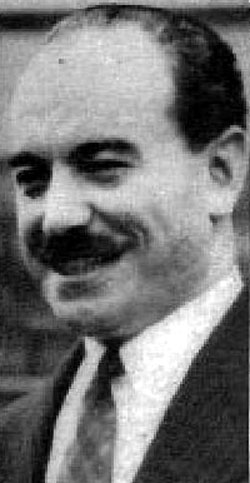- Carlos Dávila
Infobox_President | name=Carlos Dávila

order=President of Government Junta of Chile
term_start=June 16 ,1932
term_end=July 8 ,1932
predecessor=Arturo Puga
successor="Himself"
order2=President of Chile
term_start2=July 8 ,1932
term_end2=September 13 ,1932
predecessor2="Himself"
successor2=Bartolomé Blanche
order3=Secretary General of the Organization of American States
term_start3=1954
term_end3=October 19 ,1955
predecessor3=Alberto Lleras Camargo
successor3=José A. Mora
birth_date=birth date|1887|9|15|mf=y
birth_place=Los Ángeles ,Chile
death_date=death date and age|1955|10|19|1887|9|15|mf=y
death_place=Massachusetts ,United States
spouse=Herminia Arrate
spouse2=Frances Adams Moore Carlos Gregorio Dávila Espinoza (
September 15 ,1887 -October 19 1955 ), was aChile anpolitical figure , Chairman of Government Junta of Chile in 1932, and Secretary General of theOrganization of American States from 1954 until his death in 1955.Early life
Dávila was born in
Los Ángeles, Chile toLuis Dávila andEmilia Espinoza . He graduated from theUniversity of Santiago, Chile (then called School of Arts and Crafts) in 1907. In 1911, he enteredLaw School at theUniversity of Chile , but dropped out three years later to work for newspaper “El Mercurio ”, of Santiago. He left that paper in 1917 to establish “La Nación” of the same city, which he directed until 1927. In 1932, he founded the Chilean magazine, “Hoy”.Political career
From 1927 to 1931, Dávila served as
Chilean Ambassador to the United States . In 1929, he received an honoraryLL.D. fromColumbia University , and another the same year from theUniversity of Southern California , inLos Angeles .In 1932 Dávila was a member of the Government Junta and for several months provisional
President of Chile . In 1933, Dávila was visiting Professor of International Law at theUniversity of North Carolina at Chapel Hill , under the auspices of theCarnegie Endowment for International Peace . Later he came to theUnited States and was associated for many years with theEditors’ Press Service , and acted as correspondent for numerous importantSouth America n newspapers. In 1941 he received theMaria Moors Cabot Award fromColumbia University for his distinguished journalistic contribution in the service ofthe Americas . A prolific writer, Dávila is the author of “We of the Americas”, published in 1949 and has contributed many analytical studies on politics and economics to leading American publications.Dávila served on the Council of
UNRRA from 1943 to 1946, and was Chilean Representative to theInter-American Financial and Economic Advisory Committee in 1940. In the same year, he became the author of the “Dávila plan”, which created theInter-American Development Commission . In 1946, he served as a member of theUnited Nations Economic and Social Council .Dávila’s first wife, Herminia Arrate de Dávila, died in Chile in 1941, and Dávila returned to the United States with their two daughters, Luz and Paz. In 1950, he remarried, this time to Frances Adams Moore of
Massachusetts , a widow with a daughter, “Dolly”, by her first husband. Dávila died while serving as Secretary General of the OAS, in 1955.References
* [http://www.oas.org/children/SecGen/davila.html OAS Children's site]
* [http://icarito.latercera.cl/biografias/1925-1958/bios/davila.htm Icarito]
* [http://www.time.com/time/magazine/article/0,9171,753332-1,00.html "Progressive Socialism" in Chile - Time Magazine (1932)]
Wikimedia Foundation. 2010.
